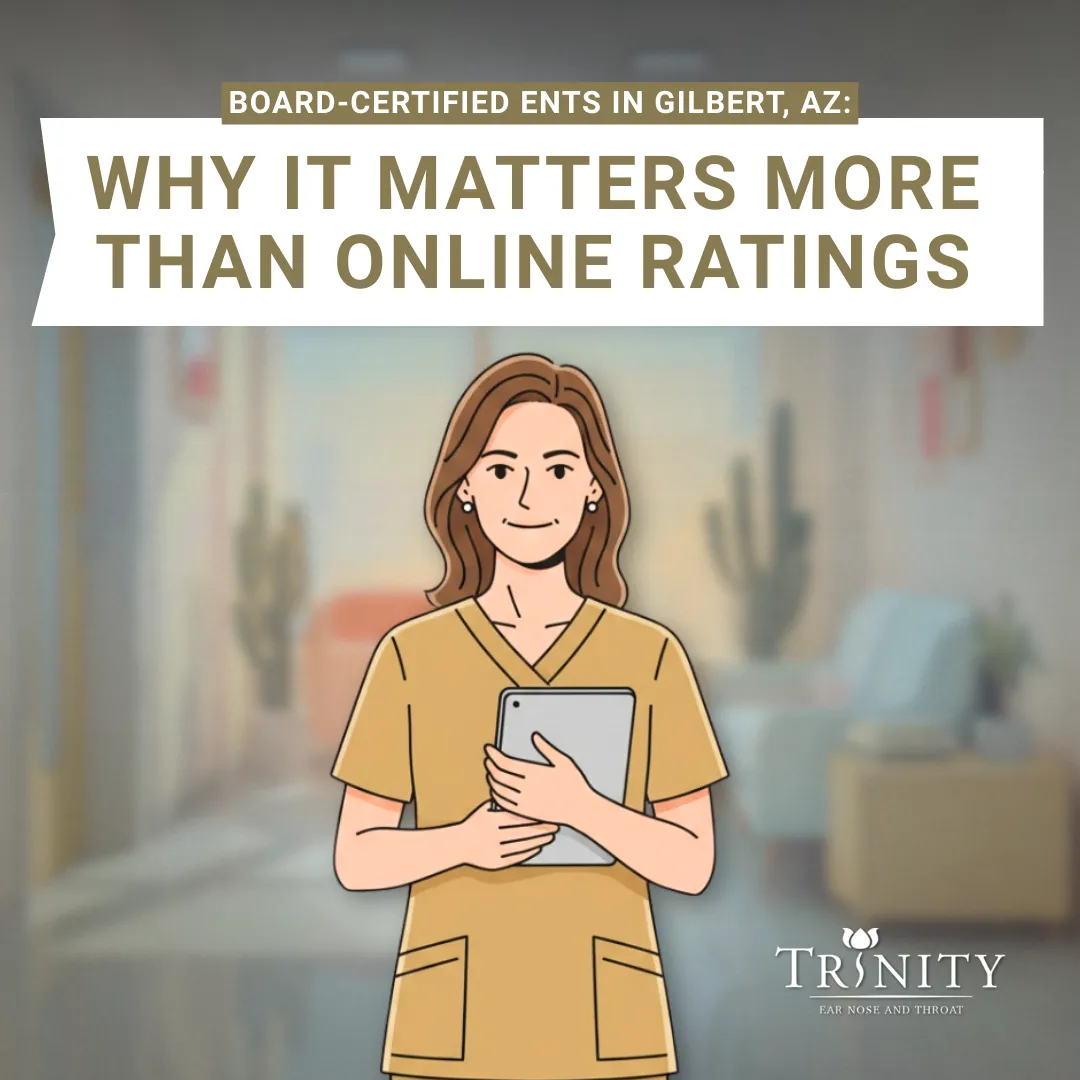How to Manage Fall Allergies in Arizona
Fall in Arizona may bring cooler mornings, but it also ushers in allergy season across Gilbert, Mesa, and Tempe. Ragweed, tumbleweed, and lingering mold spores make breathing difficult for many East Valley residents. By starting medications early, tracking pollen levels, and keeping indoor air clean, you can reduce allergy flare-ups. At Trinity ENT, we offer comprehensive allergy testing, personalized treatment plans, and long-term solutions like immunotherapy to help you breathe easier and enjoy the season with fewer symptoms.
How to Manage Fall Allergies in Arizona
Fall brings cooler mornings and hints of pumpkin spice to the Valley—but it also brings a surge of allergy symptoms for many residents across Gilbert, Mesa, and Tempe. As Arizona transitions between seasons, pollen and mold become constant companions in the air, making this one of the most challenging times for allergy sufferers.
At Trinity ENT, we help patients understand what causes fall allergies in Arizona and how to manage symptoms effectively throughout the season.

Arizona Fall Allergies: What You Should Know
Unlike many states, Arizona’s warm, arid climate means that plants and weeds continue releasing pollen almost year-round. The fall season is especially tough because:
- Ragweed pollen peaks between September and November and is one of the most common triggers.
- Grass pollen and Russian thistle (tumbleweed) can remain active through late fall.
- Mold spores increase after monsoon rains and from decomposing leaves.
- Windy, dry weather spreads pollen and dust across long distances throughout the East Valley.
Common Fall Allergy Symptoms
- Sneezing and nasal congestion
- Runny or itchy nose
- Watery, irritated eyes
- Scratchy throat or cough
- Headaches and fatigue
If these symptoms persist or worsen, professional allergy testing may help identify the exact triggers affecting you.
Effective Strategies for Allergy Care in Mesa, Gilbert, and Tempe
You don’t have to let seasonal allergies control your fall. These evidence-based steps may help reduce discomfort and improve your daily breathing:
✅ Get allergy testing
Allergy testing helps identify your specific triggers so your ENT or allergist can design a personalized treatment plan tailored to your needs.
✅ Start medications early
Begin antihistamines or nasal sprays before peak allergy season to reduce inflammation and ease symptoms.
✅ Track daily pollen levels
Use local weather apps or allergy trackers for Mesa or Gilbert to plan outdoor activities around high pollen days (often early mornings).
✅ Keep indoor air clean
Vacuum frequently, wash bedding weekly, and change HVAC filters monthly during heavy pollen periods.
✅ Keep windows and doors closed
Limit outdoor allergens from entering your home, especially on windy days.
✅ Rinse and refresh
Shower and change clothes after spending time outdoors to remove pollen from skin and hair.
✅ Stay healthy
Support your immune system with proper hydration, nutrition, regular exercise, and adequate sleep.
✅ Consider immunotherapy
For patients whose allergies persist despite medications, sublingual immunotherapy (SLIT) or allergy drops may help decrease sensitivity to specific allergens over time. Your ENT can determine whether you’re a good candidate.
When to See an ENT in the East Valley
If allergy symptoms are interfering with your work, sleep, or quality of life, it may be time for professional care. Persistent nasal congestion, recurring sinus infections, or dependence on allergy medication could indicate underlying sinus or immune issues that need evaluation.
At Trinity ENT, our team provides comprehensive allergy and sinus assessments for patients in Gilbert, Mesa, and Tempe, including testing, medical management, and minimally invasive treatment options.
Breathe Easier This Fall in Arizona
Seasonal allergies may be common in the East Valley, but with proactive care and guidance from your ENT, many patients find relief and regain control over their symptoms.
🍂 Schedule a consultation with Trinity ENT today to learn more about allergy testing and management options designed for Arizona’s unique climate.
The information provided in this article is for informational and educational purposes only and does not constitute medical advice. It is not intended to diagnose, treat, cure, or prevent any disease or medical condition. Always seek the guidance of your physician or other qualified healthcare provider with any questions you may have regarding a medical condition or treatment.
Results may vary: Treatment outcomes and health experiences may differ based on individual medical history, condition severity, and response to care.
Emergency Notice: If you are experiencing a medical emergency, call 911 or seek immediate medical attention.

.png)
.png)

